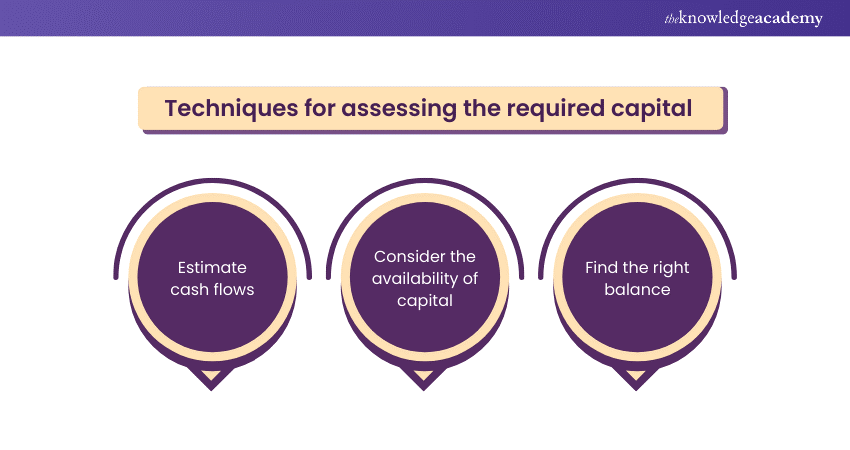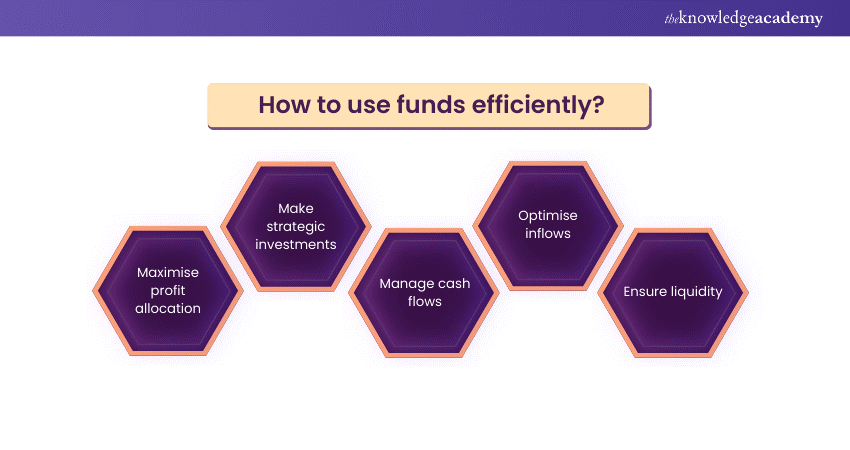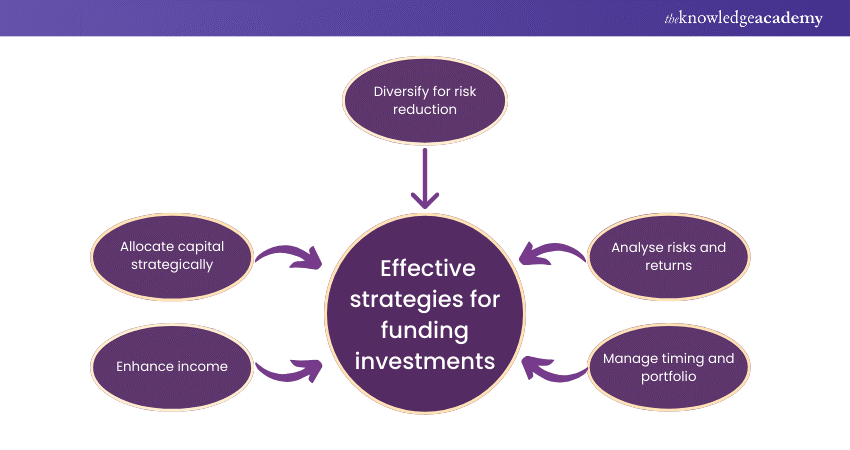We may not have the course you’re looking for. If you enquire or give us a call on 01344203999 and speak to our training experts, we may still be able to help with your training requirements.
Training Outcomes Within Your Budget!
We ensure quality, budget-alignment, and timely delivery by our expert instructors.

Financial Management is the process of planning, organising, directing, and controlling the financial resources of an organisation. It involves making decisions about how to raise, allocate, and use funds in the most efficient and effective way. Financial Management functions are the specific tasks that Financial Managers perform to carry out this process.
In this blog, we will discuss the top 10 Functions of Financial Management and how they contribute to the financial health and performance of an organisation.
Table of Contents
1) Crucial Functions of Financial Management
a) Assessing the required capital
b) Defining the capital structure
c) Selecting funding sources
d) Acquiring financial resources
e) Efficient use of funds
f) Handling surplus funds or profits
g) Cash management
h) Financial oversight
i) Fund investments
j) Enforcing financial controls
2) Conclusion
Crucial Functions of Financial Management
From assessing the capital required to funding new investments, there are many Functions of Financial Management. Let's explore the crucial ones here:
1) Assessing the required capital
Assessing the required capital is a crucial function of Financial Management that determines how much money or assets an organisation needs to achieve its goals. It involves the following fuctions:

1) Estimate cash flows: Financial Managers have to project the future financial outcomes of the organisation based on the current and expected market conditions, growth opportunities, and risks. They have to use various techniques, such as the net present value, the internal rate of return, the payback period, etc. to evaluate the profitability and feasibility of different projects and activities.
2) Consider the availability of capital: Financial Managers have to analye the supply and demand of capital in the market and the impact of various factors, such as the interest rate, the inflation rate, the exchange rate, the tax rate, etc. on the cost of capital. They have to compare the advantages and disadvantages of using different sources of capital, such as equity, debt, or retained earnings, and their implications for the ownership, control, and risk of the organisation.
3) Find the right balance: Financial Managers have to balance the trade-off between profitability, liquidity, solvency, and risk. They have to select the amount and type of capital that best suits the needs and objectives of the organisation and its stakeholders.
Assessing the required capital is essential for the success of any organisation, as it helps to plan, allocate, and use the financial resources in the most efficient and effective way. It also helps to avoid undercapitalisation or overcapitalisation, which can have negative consequences for the financial health and performance of the organisation.
2) Defining the capital structure
Another function of Financial Management is to define the capital structure of an organisation, which is the mix of equity and debt that an organisation uses to finance its activities. The capital structure affects the profitability, liquidity, solvency, and risk of an organisation. Financial Managers have to determine the optimal capital structure that maximises the value of the organisation and minimises the cost of capital.
They have to balance the benefits and drawbacks of using more equity or more debt, such as the ownership dilution, tax advantages, interest payments, and financial flexibility.
3) Selecting funding sources
Once the required capital and the capital structure are determined, Financial Managers have to select the appropriate sources of funding for the organisation. There are various sources of funding available for an organisation, such as issuing shares, bonds, debentures, bank loans, venture capital, angel investors, crowdfunding, etc. Each source has its own advantages and disadvantages, such as the interest rate, maturity, repayment terms, collateral, ownership rights, etc.
Financial Managers have to evaluate the suitability and feasibility of each source and choose the ones that best match the needs and objectives of the organisation.
4) Acquiring financial resources
The next function of Financial Management is to acquire the financial resources from the selected sources of funding. This involves preparing and presenting the financial statements, business plans, and proposals that show the financial position, performance, and potential of the organisation. It also involves negotiating and finalising the terms and conditions of the funding agreements, such as the price, quantity, timing, and mode of payment.
Financial Managers have to ensure that the organisation obtains the required amount of funds at the lowest possible cost and with the least possible risk.
5) Efficient use of funds
Another important function of Financial Management is to ensure the efficient use of funds in the organisation. This means allocating and utilising the funds in the most productive and profitable way. Financial Managers have to decide how to invest the funds in various projects, assets, and activities that generate the highest returns and create value for the organisation.

They also have to monitor and control the cash flow and working capital of the organisation, which are the funds that are used for the day-to-day operations and transactions. Financial Managers have to optimise the cash inflows and outflows and maintain the optimal level of liquidity and solvency.
Master cash flow analysis with our Forecasting and Analysing Cash Flow Training – Sign up now!
6) Handling surplus funds or profits
Another function of Financial Management is to handle the surplus funds or profits that the organisation generates from its operations and investments. Surplus funds are the excess of revenues over expenses, or the difference between the actual and the required funds. Financial Managers have to decide how to distribute or reinvest the surplus funds in the best interest of the organisation and its stakeholders.
They have to choose between paying dividends to the shareholders, retaining earnings for future growth, or repaying debts to the creditors. They also have to consider the tax implications, legal obligations, and market expectations of each option.
7) Cash management
Cash management is the function of Financial Management that deals with the collection, disbursement, and management of cash and cash equivalents in the organisation. Cash and cash equivalents are the most liquid and readily available assets that an organisation has, such as currency, bank deposits, cheques, etc.
Cash management is crucial for the smooth and uninterrupted functioning of the organisation, as it ensures that there is enough cash to meet the current and future obligations and opportunities. Financial Managers have to forecast the cash inflows and outflows, prepare the cash budget, and implement the cash policies and procedures that regulate the cash transactions and balances.
8) Financial oversight
Financial oversight is the function of Financial Management that involves the supervision, evaluation, and reporting of the financial activities and results of the organisation. Financial oversight is essential for the accountability, transparency, and compliance of the organisation, as it ensures that the financial resources are used in accordance with the plans, policies, and regulations.
Financial Managers have to oversee the preparation and presentation of the financial statements, such as the income statement, balance sheet, cash flow statement, etc. They also have to conduct the financial analysis, such as the ratio analysis, trend analysis, variance analysis, etc. that measure the financial performance, position, and health of the organisation.
9) Fund investments
Fund investments is the function of Financial Management that involves the allocation of funds to various securities, such as stocks, bonds, mutual funds, etc. that offer returns and diversification.

Fund investments are a way of earning income and increasing the value of the funds, as well as reducing the risk and uncertainty of the funds. Financial Managers have to decide which securities to invest in, how much to invest, when to invest, and when to sell. They have to consider the risk-return trade-off, the market conditions, the portfolio objectives, and the Investment strategies of each security.
Chart a course to financial excellence with our Accounting & Finance Training – Sign up now!
10) Enforcing financial controls
The last function of Financial Management is to enforce the financial controls that ensure the accuracy, reliability, and security of the financial information and transactions of the organisation. Financial controls are the rules, standards, and procedures that govern the financial operations and records of the organisation.
They help to prevent and detect errors, frauds, and irregularities that may affect the financial integrity and reputation of the organisation. Financial Managers have to implement and monitor the financial controls, such as the internal and external audits, the segregation of duties, the authoriation and approval systems, the reconciliation and verification processes, etc.
Conclusion
We hope you enjoyed reading and understanding everything about “The Top 10 Functions of Financial Management. Financial Management is the backbone of a successful business. Effectively managing finances ensures a firm foundation for achieving long-term financial objectives and prosperity.
Enhance your financial acumen with our Financial Management Training – Sign up today!
Frequently Asked Questions
Upcoming Business Skills Resources Batches & Dates
Date
 Financial Management Course
Financial Management Course
Fri 28th Jun 2024
Fri 23rd Aug 2024
Fri 25th Oct 2024
Fri 27th Dec 2024







 Top Rated Course
Top Rated Course



 If you wish to make any changes to your course, please
If you wish to make any changes to your course, please


